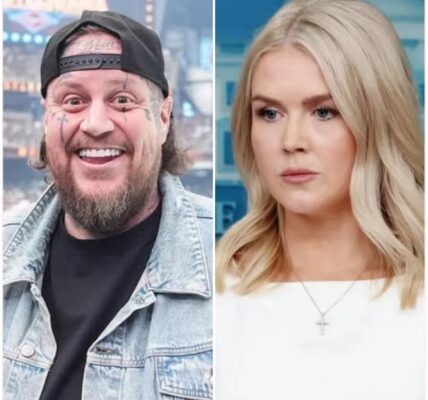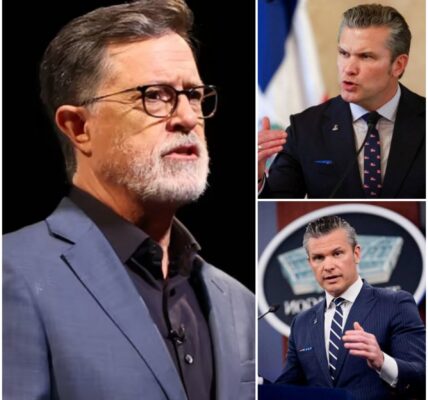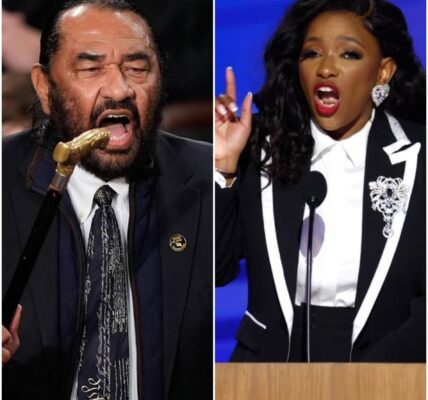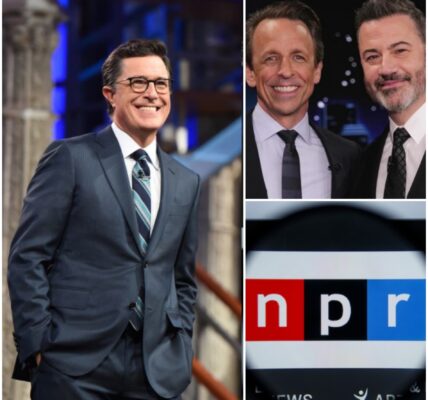On Thursday night, September 18, Jon Stewart walked back onto the set of The Daily Show — not for his usual Monday cameo, but as a last-minute replacement for his fellow late-night host Jimmy Kimmel. What should have been a routine week of comedy suddenly transformed into one of the most politically explosive nights of television in years.
The reason? Jimmy Kimmel’s show was yanked off-air indefinitely after his remarks on the tragic shooting of conservative commentator Charlie Kirk. And with that, Stewart — armed with sarcasm sharper than any sword — decided to turn Comedy Central’s stage into a frontline battlefield over the soul of American free speech.
The result? A broadcast that was equal parts comedy, horror show, and political autopsy — and it left viewers either cheering wildly or fuming in disgust.
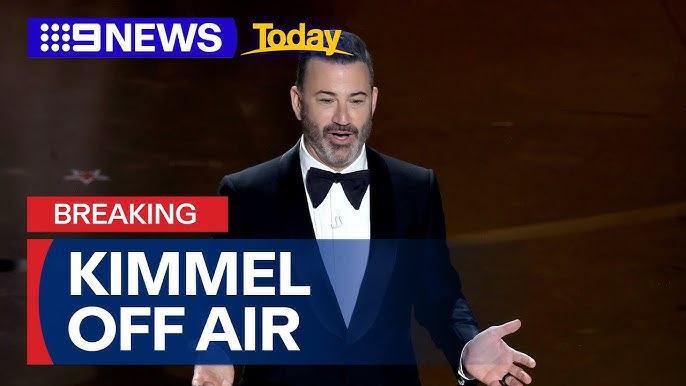
The “Perfectly Tinted” President
Stewart opened his takeover episode by unveiling a set decked out in gold — a parody of the Trumpian aesthetic so glaring it could’ve doubled as a Mar-a-Lago interior design ad. With mock reverence, he hailed President Donald Trump as “perfectly tinted”, a jab that was equal parts about spray tans and authoritarian shades of power.
When the audience began to boo, Stewart raised a finger to his lips: “Shh… remember, we have to be compliant. Our great leader does not appreciate noise from the peasants.”
The bit set the tone: this wasn’t just another late-night sketch. It was a theatrical satire — a desperate scream wrapped in a joke — about how fragile the line between democracy and dictatorship had become.
Free Speech, “the Administration-Compliant Way”
Then came the meat of Stewart’s monologue: free speech. Or rather, the newly rebranded, administration-approved version of it.
“Our great administration has laid out very clear rules on free speech,” Stewart said, his voice dripping with irony. “Now, some naysayers may argue that this administration’s concerns are a cynical ploy, a thin ruse, a smoke screen to obscure the unprecedented consolidation of power. But not me. No sir. I think it’s great.”
The audience laughed, but it was the nervous kind of laughter — the kind that masks unease. Stewart wasn’t just mocking Trump or FCC Chairman Brendan Carr (who had pressed ABC to silence Kimmel). He was mocking the terrifying possibility that freedom of speech now came with an asterisk, depending on who was offended.
And in that moment, the absurdity was laid bare: a nation that prides itself on liberty had just silenced a late-night clown for telling jokes.
Jimmy Kimmel: From Jokester to Martyr

Let’s rewind. On September 15, Kimmel cracked jokes about Charlie Kirk’s death. Were they edgy? Yes. Tasteless to some? Possibly. But did they warrant a full-scale suspension, complete with behind-the-scenes pressure from one of the country’s most powerful regulators? That’s where the outrage begins.
On September 17, ABC officially announced that Jimmy Kimmel Live! would be “pre-empted indefinitely.” Within hours, speculation swirled that Disney, ABC’s parent company, had caved to political threats. By the next day, Carr was on CNBC, celebrating Kimmel’s exile as evidence of a “massive shift in dynamics in the media ecosystem.”
Translation: comedians beware. Satire season is over; compliance season has begun.
Colbert, Letterman, and the Late-Night Rebellion
Stewart wasn’t alone in his outrage. Over on The Late Show, Stephen Colbert roared back at Carr with a line that went instantly viral:
“You know what my community values are, buster? Freedom of speech.”
Meanwhile, David Letterman — the godfather of late-night comedy — delivered one of the most sobering warnings yet at The Atlantic Festival:
“In the world of somebody who is an authoritarian, maybe a dictatorship, sooner or later, everyone is going to be touched. This is managed media. It’s silly. It’s ridiculous. And you can’t go around firing somebody because you’re fearful or trying to suck up to an authoritarian administration. That’s just not how this works.”
Except, apparently, that’s exactly how it’s working now.
A Satirical Funeral for Democracy?
Stewart didn’t mince words. His high-pitched parody song praising Trump and his red-tied entourage felt like a funeral march — not for Kimmel, but for democracy itself. Every laugh line carried the weight of grief: the grief of watching a nation that once prided itself on “freedom of expression” now punish dissent like a monarchy scolding its court jester.
And here’s the uncomfortable truth Stewart forced into the spotlight: if comedians — the very people whose job is to poke fun at power — can be silenced this easily, what happens next to journalists, activists, or ordinary citizens?
Is America really protecting “community values”? Or is it just protecting those in power from being mocked?
The Bigger Picture: Managed Media, Manufactured Outrage
What makes this moment so polarizing is how perfectly it encapsulates the age of political tribalism. For Trump’s supporters, Kimmel’s suspension is justice: punishment for “crossing the line.” For critics, it’s proof that the line itself no longer exists — only the whims of those in charge.
Meanwhile, Stewart’s return to the desk feels less like comedy and more like guerrilla warfare. He didn’t just tell jokes; he fired warning shots. He mocked, but the mockery carried venom. And perhaps that’s why his performance has ignited such ferocious debate online.
On social media, hashtags like #StandWithKimmel and #FreeSpeechIsDead trended alongside pro-Trump celebrations. The country, once again, split down the middle.
Satire as Resistance, or Satire as Provocation?
Here’s where the debate gets messier. Stewart’s critics argue that he’s simply fanning the flames, exploiting outrage for ratings. Supporters counter that satire has always been a weapon against tyranny, and Stewart is wielding it at a moment when silence would be complicity.
So what is The Daily Show now? A comedy program, or a political resistance cell disguised as one? The answer, maddeningly, might be both.
Conclusion: A Joke That Isn’t Funny
As Stewart wrapped up his biting monologue, one thing became painfully clear: the Kimmel suspension isn’t about one joke. It’s about whether jokes themselves can survive in an era of weaponized outrage and politicized censorship.
Stewart’s sarcastic grin may have earned laughter, but beneath it was a chilling warning: if free speech is reduced to whatever those in power find “acceptable,” then America is no longer laughing with its comedians. It is laughing at its own decline.
And that — as Stewart might say with a wink and a wince — is just great.





